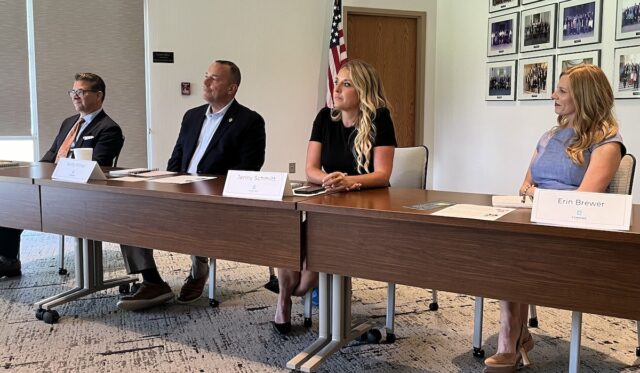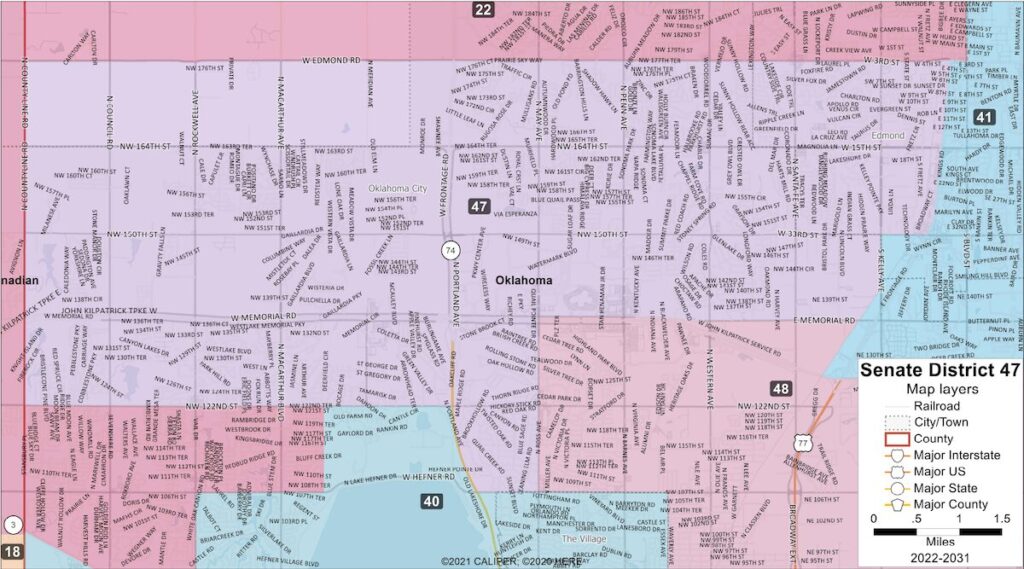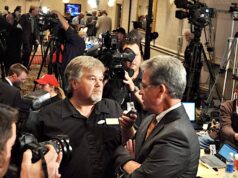

Three Republicans seeking to succeed outgoing President Pro Tempore Greg Treat in the open Senate District 47 seat all proposed placing Oklahoma on a path to eliminate the state’s personal income tax at a forum Tuesday — something the long-time Senate leader has opposed owing to unanswered questions about how core government services would otherwise be funded.
Aaron Curry, Kelly Hines and Jenny Schmitt are seeking the Republican nomination for the open seat June 18. If a candidate receives a simple majority of the vote, they will advance to a Nov. 5 general election against Erin Brewer, the lone Democrat to file candidacy for the district.
If no GOP candidate receives a simple majority, then the top two Republican finishers will compete in a runoff election Aug. 27 for Senate District 47, which covers a swath of north Oklahoma City and Edmond spanning from the Canadian County border to Broadway Extension between Edmond Road on the north and Northwest 122nd Street on the south.
All four candidates discussed Oklahoma’s growing pains, business recruitment problems and the potential impact of raising the minimum wage to $15 per hour at an Edmond Chamber of Commerce forum Tuesday.
Schmitt: ‘There’s a gap in the Senate that needs to be filled’

Curry owns and operates Catalyst Financial Group and formerly served as the Oklahoma Republican Party’s finance chairman, according to his campaign website.
During his opening statement, Curry mentioned former Oklahoma City Mayor Mick Cornett while discussing Senate District 47.
“As Mick Cornett said to me, it’s a leadership seat. It’s a seat that demands somebody that would go in day one and be able to be a positive influence for this district and also a positive influence for the state of Oklahoma,” Curry said.
Hines, a 34-year military veteran from Whitesboro in eastern Oklahoma said he spent 28 years in Army aviation and was motivated to run because of “the American dream.”
“I grew up poor. The American dream was there for me to pull up my bootstraps, work hard, opportunities were there, and I got to where I’m at today,” Hines said. “I’m concerned that that’s not going to be around if we don’t get the right people elected.”
Schmitt, who has worked as a nurse anesthetist for 20 years in Oklahoma City, said she would fill the State Senate’s health care “gap” if elected.
“There’s a gap in the Senate that needs to be filled in that area, and I think I can bring 20 years of expertise in health care,” Schmitt said. “I believe that in order to have a great, productive Oklahoma, we have to have a healthy Oklahoma first.”
Brewer, the only Democrat in the race, distanced herself from her opponents during opening statements by claiming she’s the only SD 47 candidate who has built small businesses from scratch, has children who attend public schools, and is calling for controversial State Superintendent of Public Instruction Ryan Walters “to be held accountable.”
“He is causing harm to our schools and ultimately to our kids, and we have got to put some parameters around that,” Brewer said of Walters.
Hines: ‘We’ve got a brain drain in Oklahoma’
On issues pertaining to growth and development in the Oklahoma City metro area, each candidate emphasized different points.
Hines, who now serves as vice president of operations at Aviation Training Consulting, said infrastructure issues and “brain drain” are the biggest impediments to the growing the OKC and Edmond area.
“We’ve got a brain drain in Oklahoma where a lot of our smarter — or not necessarily smarter — more educated folks or children are leaving the state when they come out of school because they can get a better job elsewhere,” Hines said. “Aerospace companies, when they look at a place to relocate, are looking for a ready employee force. So they need a workforce when they get here on day one, or at least one that’s trainable.”
After Hines’ point about young adults leaving Oklahoma, Schmitt said she believes workforce readiness is the top issue facing the state, and she highlighted the need for programs that allow students gain work experience while seeking higher education.
“We’ve got these programs in place in different types of career professions (…) that allowed me to enter the workforce and then work in the community while pursuing higher education,” Schmitt said. “I think we have to have a conversation about how can we start that process sooner.”
On workforce readiness, Brewer highlighted the state’s teacher shortage.
“If we don’t figure out how to control the teacher pipeline to recruit and retain quality, caring teachers, we are not going to produce the graduates that our companies need to continue for this area to grow,” Brewer said.
Meanwhile, Curry, an OKC representative on the Regional Transportation Authority of Central Oklahoma, said all state agencies should have plans such as the Oklahoma Department of Transportation’s eight-year construction plan that “takes the politics out.”
“Why don’t we do that with the rest of our agencies? Why don’t we have a multi-year plan?” Curry asked. “I think we could come up with something that goes 20 years. If you look at MAPS for Oklahoma City, that’s a good example of something that’s persisted beyond terms.”
Curry: ‘A small investment to make a big statement’
On the topic of attracting businesses to Oklahoma, Curry said Oklahoma’s position in the middle of the U.S. provides connectivity to everywhere else in the country, but that the state’s tax code needs to mirror such an effort.
He pointed to Tennessee, which he said brought their income tax rate from 7 percent to zero over five years. Like Curry, Hines and Schmitt also voiced support for eventually eliminating Oklahoma’s income tax rate — something Treat (R-OKC) opposed the last two legislative sessions.
“Income tax should have been lowered. The governor called for it. The legislators just didn’t produce or come forward and look at reducing it,” Hines said. “The grocery tax [cut] was a great move, but I would say that was a softball. That was fairly easy to hit and wasn’t going to make anybody mad. What we really need to do is attack the hard stuff like the income tax.”
Curry called for a “smart tax code’ to attract businesses.
“I think something really simple like incentivizing airlines to have direct flights all around the country,” Curry said. “That’s a very small investment to make a big statement to allow these businesses that want to have those kinds of amenities and attractions.”
Hines said Oklahoma needs to continue building relationships with businesses across state lines and international borders.
“When Oklahoma sends a delegation to things like the Paris Air Show, they send them to Oshkosh — it is not cheap — but it’s a great investment in our future,” Hines said.
Schmitt said she wants to help Oklahoma companies before recruiting others.
“Obviously, we need to fill gaps in the business communities that we’re missing, but before we start sending our money to non-Oklahoma companies, I want to make sure that our Oklahoma companies that are currently here are taken care of first,” Schmitt said.
Brewer said she hears concerns from business owners about the impact of Oklahoma’s education climate on recruiting employees.
“The thing I hear when I talk to business owners all the time is they are lacking the skilled employees,” Brewer said. “But when they try to recruit employees into Oklahoma, often they find pushback because people are worried about our school system.”
Brewer: ‘Not all business owners have that level of integrity’
Asked for her stance on a potential ballot initiative that would raise the state’s minimum wage from $7.25 to $15 an hour by 2029, Schmitt said she does not believe the government should force businesses to increase their costs.
“I think ultimately you’re going to see them decrease the amount of employees they have, which ultimately might end up raising costs for us because they’re going to be generating less revenue,” Schmitt said. “If it was on a state question right now, and you’re asking me how I would vote, I would vote against it.”
Hines said those who want better wages should get better jobs.
“You know, it sounds a little heartless, but you’ve got to get a better job if it’s not quite paying what you want,” Hines said. “We never meant for McDonald’s or Burger King to be supporting a family, and that’s where we’re at right now.”
Curry said he would never teach his children to wait for politicians to implement a wage increase.
“I think we should all be teaching our children that if you really want your wages to go up, here’s some great ethics and work ethic and talents and skills you can grow to increase your wages,” Curry said. “Today in Oklahoma, if you show up on time and you’re nice, you have a job. There’s no doubt about that.”
Brewer said some businesses are committed to paying their employees livable wages, but not all.
“Like most of the business owners that are members of the Edmond Chamber, I’m committed to paying my employees well and ensuring that they succeed as individuals, that they have access to health care [and] that they have the things to support their family,” Brewer said. “But the truth is not all business owners have that level of integrity, and there are people in Oklahoma who do work for minimum wage, and they are trying to raise a family and they’re working multiple jobs.
“I think it is right for the voters of Oklahoma to have a voice in this issue because they deserve to have good pay,” Brewer said.




















